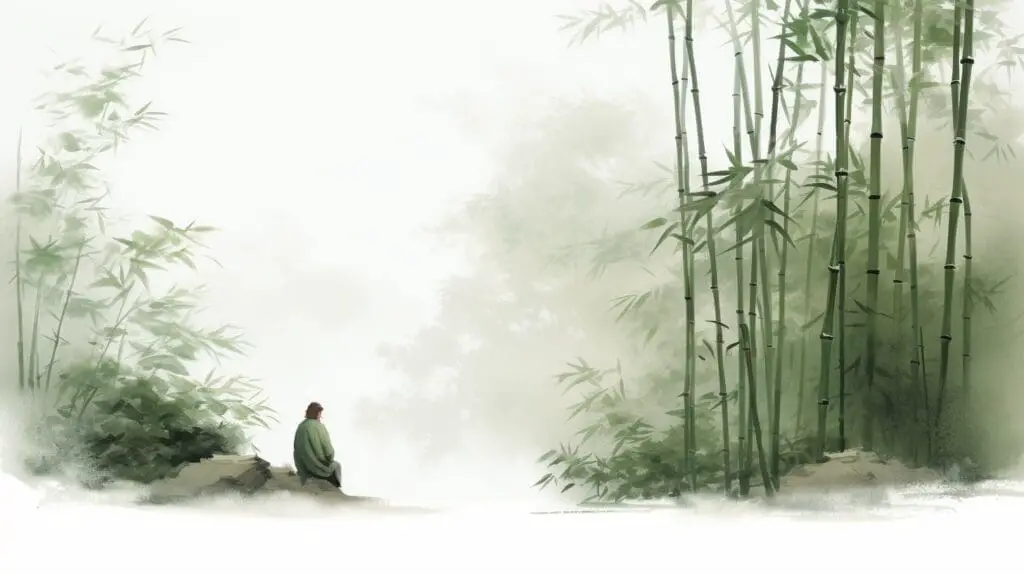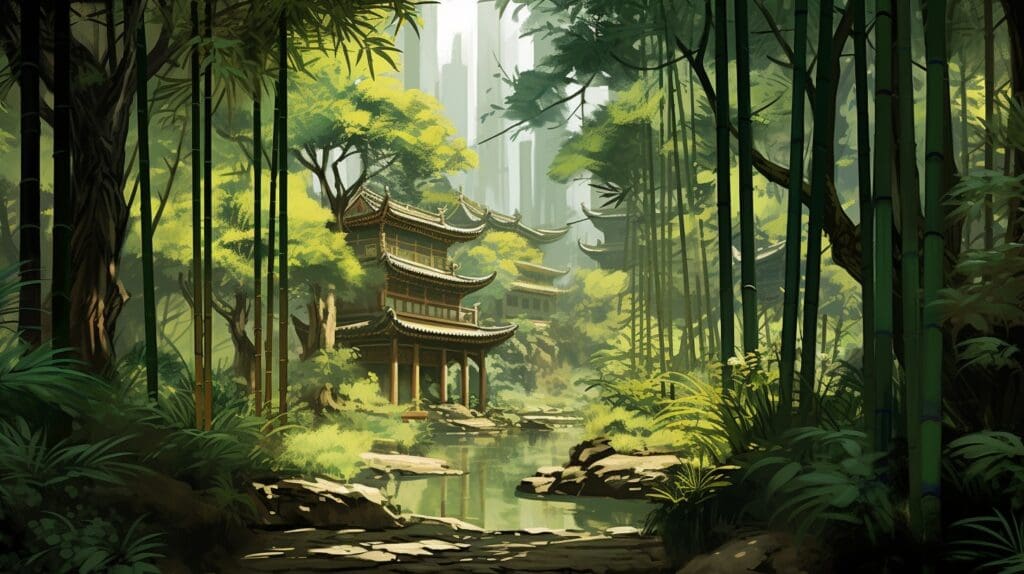Bamboo Symbolism in Chinese Culture: Exploring the Roots of This Enduring Motif
Did you know bamboo holds powerful symbolism in Chinese culture? Explore the deep roots of this enduring motif as we delve into its significance, historical origins, and contemporary interpretations.
Discover how bamboo represents strength, resilience, longevity, and good luck. Uncover its profound influence on Chinese art, literature, and even Feng Shui practices.
Get ready to unlock the secrets behind this ancient symbol and perhaps harness its power for yourself.
Key Takeaways
- Bamboo represents resilience, flexibility, abundance, prosperity, humility, and modesty.
- It symbolizes strength and resilience, as it can bend without breaking during powerful storms.
- Bamboo’s symbolism is deeply embedded within Chinese culture and reflects values such as adaptability and inner strength.
- It is widely used in Chinese art, literature, and architecture, representing qualities like perseverance, wisdom, and positive energy flow.
Significance of Bamboo in Chinese Culture
Bamboo has been an integral part of Chinese culture for centuries, with its significance deeply rooted in various aspects of daily life. Its symbolic meaning and cultural significance are undeniable.
In Chinese philosophy, bamboo represents resilience and flexibility, as it bends but does not break under pressure. This quality is highly valued by those who seek power and success.
Bamboo’s rapid growth also symbolizes abundance and prosperity, making it a popular motif in artworks and decorations.
Furthermore, the hollow interior of bamboo stems represents humility and modesty, qualities that are admired in traditional Chinese society.
From literature to architecture, bamboo’s presence is pervasive, reflecting its enduring importance within Chinese culture. Its symbolism serves as a reminder to strive for strength, adaptability, and inner virtues while navigating through life’s challenges.
Historical Origins of Bamboo Symbolism
While historians are still debating the exact origins, bamboo symbolism has been present in Chinese culture for centuries. Its historical origins can be traced back to ancient times, where it was revered for its strength and resilience.

The cultural significance of bamboo is deeply rooted in Chinese society, representing various virtues and ideals that resonate with the audience seeking power. These include:
- Perseverance: Bamboo’s ability to withstand harsh weather conditions symbolizes resilience and determination.
- Flexibility: Just like bamboo sways with the wind but never breaks, it represents adaptability and the willingness to change.
- Endurance: Bamboo’s longevity echoes the desire for a long-lasting legacy.
Bamboo’s allure lies not only in its physical properties but also in the profound messages it conveys. It serves as a reminder of the power that comes from inner strength and adaptability – qualities essential for those who aspire to wield influence.
Bamboo as a Symbol of Strength and Resilience
Bamboo’s enduring symbolism and its representation of resilience in Chinese culture is a fascinating topic to explore.
The significance of bamboo as a symbol of strength and resilience can be traced back to ancient times, where it was revered for its ability to bend without breaking during powerful storms.
This enduring motif has permeated various aspects of Chinese culture, from art and literature to architecture and everyday life.
Bamboo’s Enduring Symbolism
The enduring symbolism of bamboo in Chinese culture can be traced back to ancient times. Throughout history, bamboo has played a significant role in Chinese traditions and ceremonies, symbolizing various aspects of power and prosperity.
Here are three ways in which bamboo’s cultural significance and its role in traditional ceremonies have made it an enduring symbol:
- Strength and flexibility: Bamboo’s ability to bend without breaking represents resilience and adaptability, qualities that are highly valued by those seeking power.
- Growth and abundance: Bamboo’s rapid growth rate symbolizes progress, wealth, and success. Its tall stature signifies upward movement towards power and achievement.
- Purity and simplicity: The hollow interior of bamboo represents emptiness or purity, reminding individuals of the need to let go of material desires in order to attain true power.
Overall, the enduring symbolism of bamboo exemplifies the values that resonate deeply within Chinese culture – strength, growth, purity – making it a powerful motif in their customs and ceremonies.
Resilience in Chinese Culture
You can see resilience deeply embedded in the traditions and customs of Chinese culture. From their appreciation of nature to their symbolism, the Chinese have a profound understanding of resilience.
Nature is often seen as a powerful force that demonstrates resilience, and this belief is reflected in Chinese culture. For example, bamboo, with its ability to bend without breaking during strong winds, is revered for its resilience in Chinese society.



The symbolism of bamboo extends beyond China and can be found in other cultures as well. In Japanese culture, bamboo symbolizes strength and purity, while in Indian culture it represents friendship and loyalty. This shows that the concept of resilience transcends boundaries and resonates with people from different backgrounds who desire power and strength in their lives.
Bamboo in Chinese Art and Literature
In Chinese art and literature, bamboo has been a cherished symbol for centuries. Its significance can be seen in both poetry and painting.
Bamboo is often used as a metaphor for resilience, strength, and integrity. In Chinese poetry, bamboo is frequently featured to convey the ideals of modesty, perseverance, and adaptability. The imagery of bending but not breaking represents the power to withstand challenges and remain rooted in one’s values.
In Chinese painting, bamboo is portrayed with great attention to detail, capturing its graceful form and delicate leaves. The brushstrokes used to depict bamboo demonstrate the artist’s skill and mastery over their craft.
Bamboo as a Symbol of Longevity and Immortality
As we delve further into the symbolism of bamboo in Chinese culture, it is important to explore its significance in festivals and its representation as a symbol of wisdom and flexibility.
In Chinese festivals, bamboo plays a vital role, serving as a powerful symbol of strength and resilience. It is often used to create intricate decorations and structures that adorn the streets during these festivities. The presence of bamboo in such celebrations reflects its deep-rooted cultural importance.
Moreover, bamboo is revered for its association with wisdom and flexibility. Its ability to bend without breaking is seen as a metaphor for adaptability in the face of challenges. Just like how the flexible bamboo sways with the wind, those who possess wisdom can navigate through life’s uncertainties with grace and ease.
Bamboo as a Symbol of Feng Shui and Good Luck
If you’re looking to invite good luck and prosperity into your life, consider incorporating Feng Shui auspicious bamboo in your home or workspace.
This traditional Chinese practice believes that certain elements, like the auspicious bamboo, can enhance positive energy flow and attract wealth and success.
The vibrant green color of the bamboo symbolizes growth and vitality, making it a popular choice for those seeking abundance in their lives.
In feng shui practices, bamboo is believed to bring good luck, abundance, and positive energy into the home or office. This versatile plant is not only valued for its aesthetic appeal but also for its ability to create a harmonious environment.
The use of bamboo in interior design has become increasingly popular due to its association with prosperity and success. Its tall, upright growth represents strength and resilience, making it an ideal symbol for those who desire power and achievement.
Whether used as a decorative element or as a living plant, Feng Shui Auspicious Bamboo adds a touch of elegance while promoting balance and prosperity in any space.
Bamboo and Prosperity
In Chinese culture, bamboo has long been associated with prosperity and abundance. Its tall and straight stature represents strength and resilience, characteristics highly valued by those who desire power. Bamboo’s fast growth rate also reflects the ability to accumulate wealth quickly.



Furthermore, bamboo holds great importance in traditional Chinese medicine. Different parts of the plant are used for various healing purposes. The leaves are known to have antiviral properties, while the stems are used to treat respiratory conditions such as coughs and asthma. Additionally, the roots are believed to have analgesic properties that can alleviate pain.
Contemporary Interpretations of Bamboo Symbolism in Chinese Culture
Explore how contemporary artists infuse new meanings into bamboo symbolism in Chinese culture.
In recent times, the traditional symbolism of bamboo has undergone a fascinating transformation, with modern interpretations adding depth and complexity to its significance. Here are three ways contemporary artists have reimagined this ancient motif:
- Contrasting textures: Artists use various mediums to create contrasting textures that represent the resilience and flexibility of bamboo. The juxtaposition of smooth surfaces against rough edges evokes the duality of strength and vulnerability.
- Bold color choices: Departing from the traditional shades of green, artists experiment with vibrant hues to convey emotions and provoke thought. Bright oranges symbolize energy and passion, while deep blues evoke tranquility and introspection.
- Abstract forms: Contemporary artists often distort or deconstruct the physical shape of bamboo to explore abstract concepts such as time, identity, or societal change. These unconventional representations challenge viewers’ perceptions and invite contemplation.
Through their modern symbolism, these artists breathe new life into the timeless meaning of bamboo in Chinese culture, creating art that resonates with power and relevance for today’s audience.
Conclusion
Through its historical origins, we discovered that bamboo represents strength and resilience, as well as longevity and immortality.
The significance of bamboo in Chinese art and literature cannot be understated, showcasing its importance in their society.
Furthermore, bamboo’s association with feng shui and good luck adds another layer to its symbolism.

